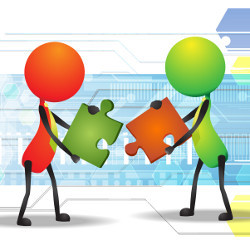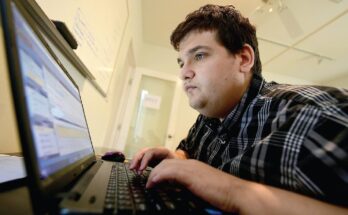Communications of the ACM, July 2019, Vol. 62 No. 7, Pages 26-28
Broadening Participation: “A New Labor Market for People with ‘Coolabilities’“
By David Nordfors, Chally Grundwag, V. R. Ferose
Many people with disabilities have enhanced strengths, such as the special ability of blind people to interpret sounds and touch, or the outstanding knack of people on the autism spectrum to observe detail. Not so well known is the potential of this large and untapped resource of excellence for the economy and society. We call these enhanced strengths “coolabilities.”
Powerful technologies are today ready to open the door to a new paradigm of work: instead of squeezing people into existing job slots, companies can tailor work that fits individuals’ unique skills, talents, and passions, matching them with inspiring teams and offering them a choice of meaningful tasks. This has tremendous benefits for both the employee and employer by creating a “long-tail labor market” in which diversity brings competitive advantage.
People with coolabilities can spearhead the new market for tailored jobs because they are a particularly underutilized resource.
A “People-Centered Economy” (PCE) with Tailored Jobs for All
The authors are members of the Innovation for Jobs community (i4j),a co-founded in 2012 by David Nordfors and Vinton Cerf, co-inventor of the Internet. We champion the “People-Centered Economy” (PCE) as covered in our recent book.b Like the Copernican revolution, the PCE shifts the point of reference of our economy: centering it on the value of people and placing what is central today—tasks, services, products—in orbit. This changes the driving economic force from minimizing the cost of tasks to maximizing the value of people. It is a recipe for sustainability: tasks will come and go; people will remain. The purpose of things is to make people valuable, not the other way around.
The value in an economy, according to PCE, boils down to the value that its people see in each other. The economy is defined as people embedded in an ecosystem of organization that competes to make them valuable for each other. Seen this way, it is the purpose of organizations to serve people; never the other way around. Organizations will offer people two basic categories of services: the first category offers people better ways to earn their livelihoods, and the second offers them better ways to spend it.
Seen through the PCE lens, the conundrum of this day and age, whether AI will create or kill jobs, becomes crystal clear, it is simply the case of a balanced economy: “Is AI-innovation being applied more to earning or to spending?” The emphasis today is on “spending,” that is, increasing demand for products and services, so the conclusion is that we need to support innovation that helps people earn. We need as much innovation for earning a living as we have for helping people spend what they earn.
Such innovation must be based on an “ecosystem for innovating jobs,” which largely remains to be developed. As people gain power in the PCE, entrepreneurs seeking revenues look for demographics of undervalued people for whom they can innovate more valuable jobs. This is the emerging role that our i4j community serves today.
About the authors:
-
David Nordfors is CEO and co-founder of i4j Innovation for Jobs, Palo Alto, CA, USA.
-
Chally Grundwag spearheads the development of the coolabilities concept, Palo Alto, CA, USA.
-
V.R. Ferose leads i4j’s coolabilities. ai project and is Senior Vice President and Head of Globalization Services at SAP, Palo Alto, CA, USA.




